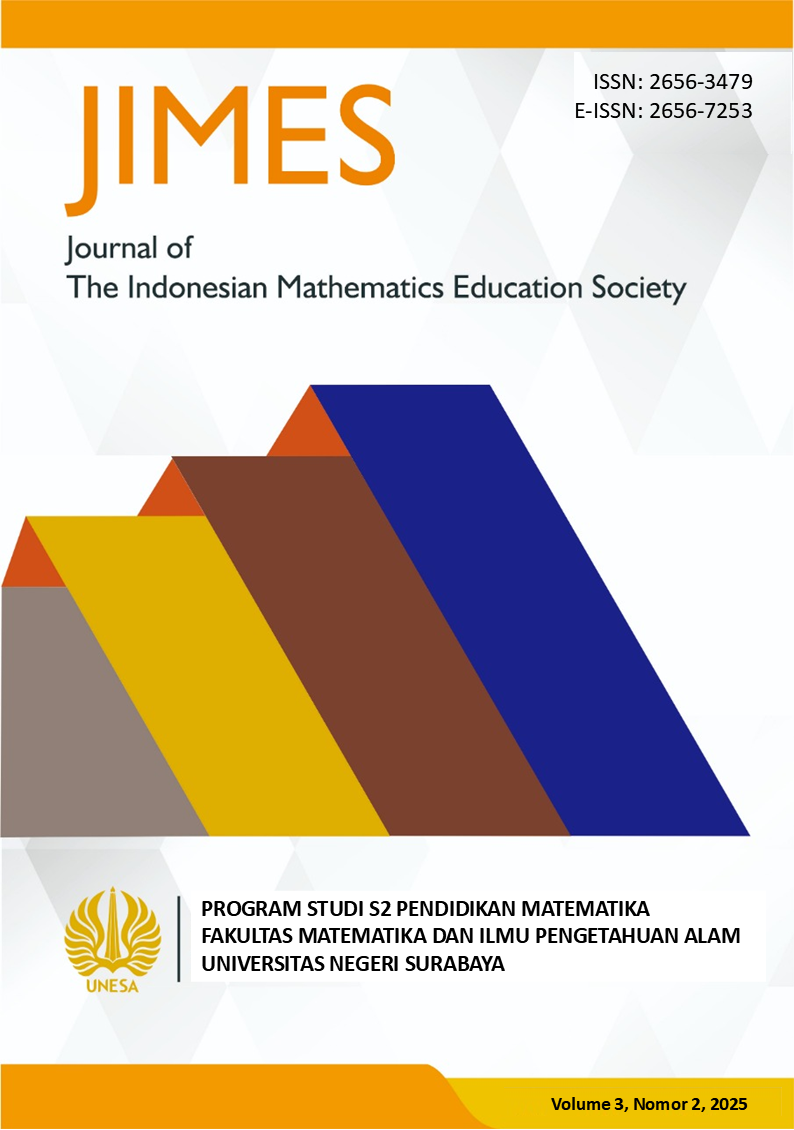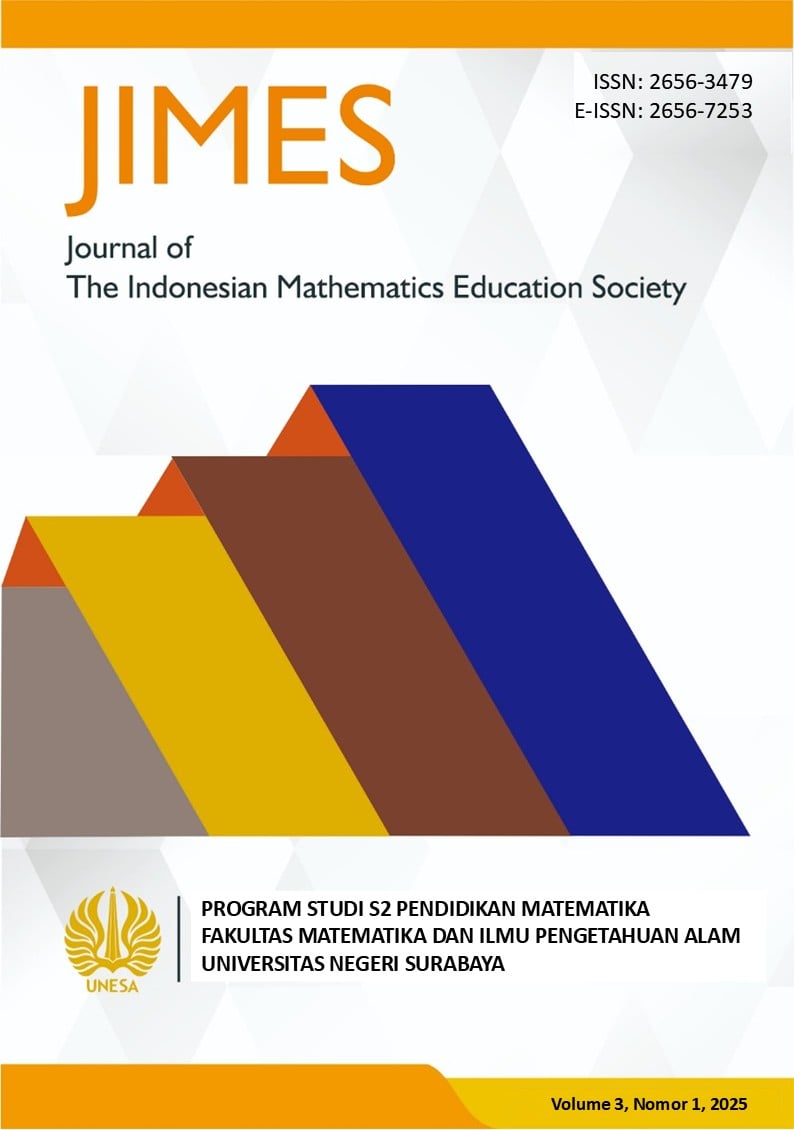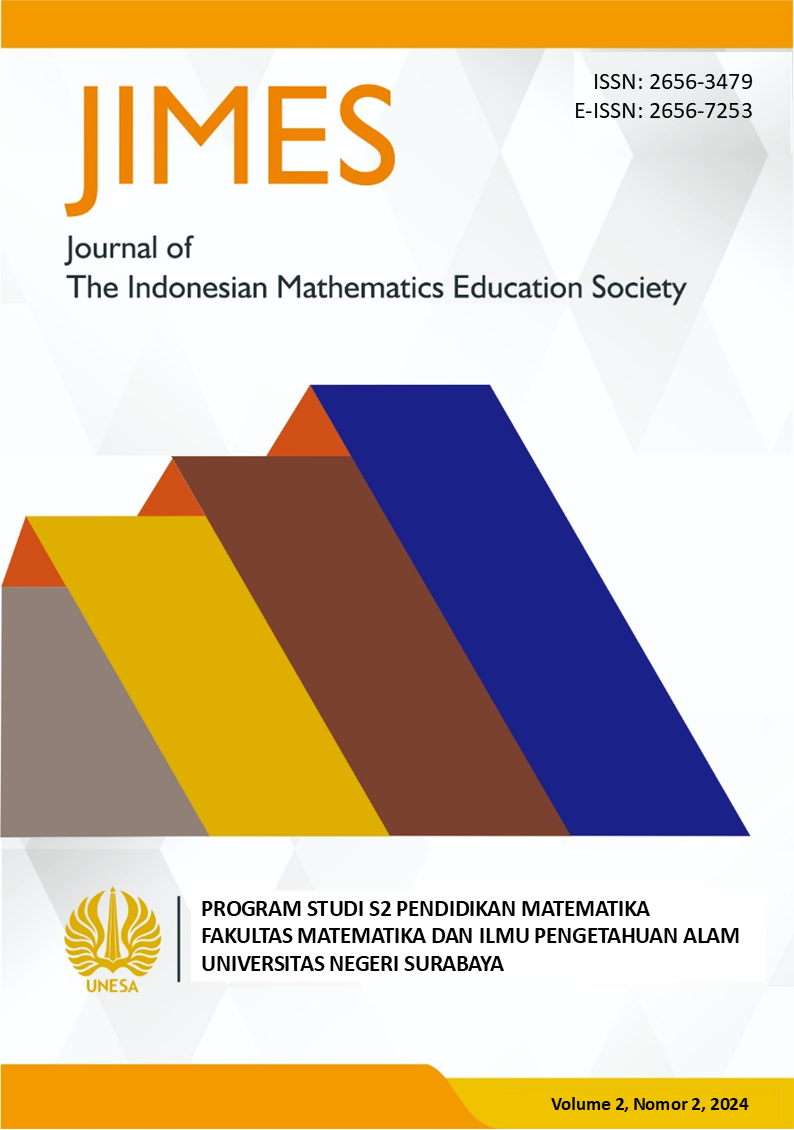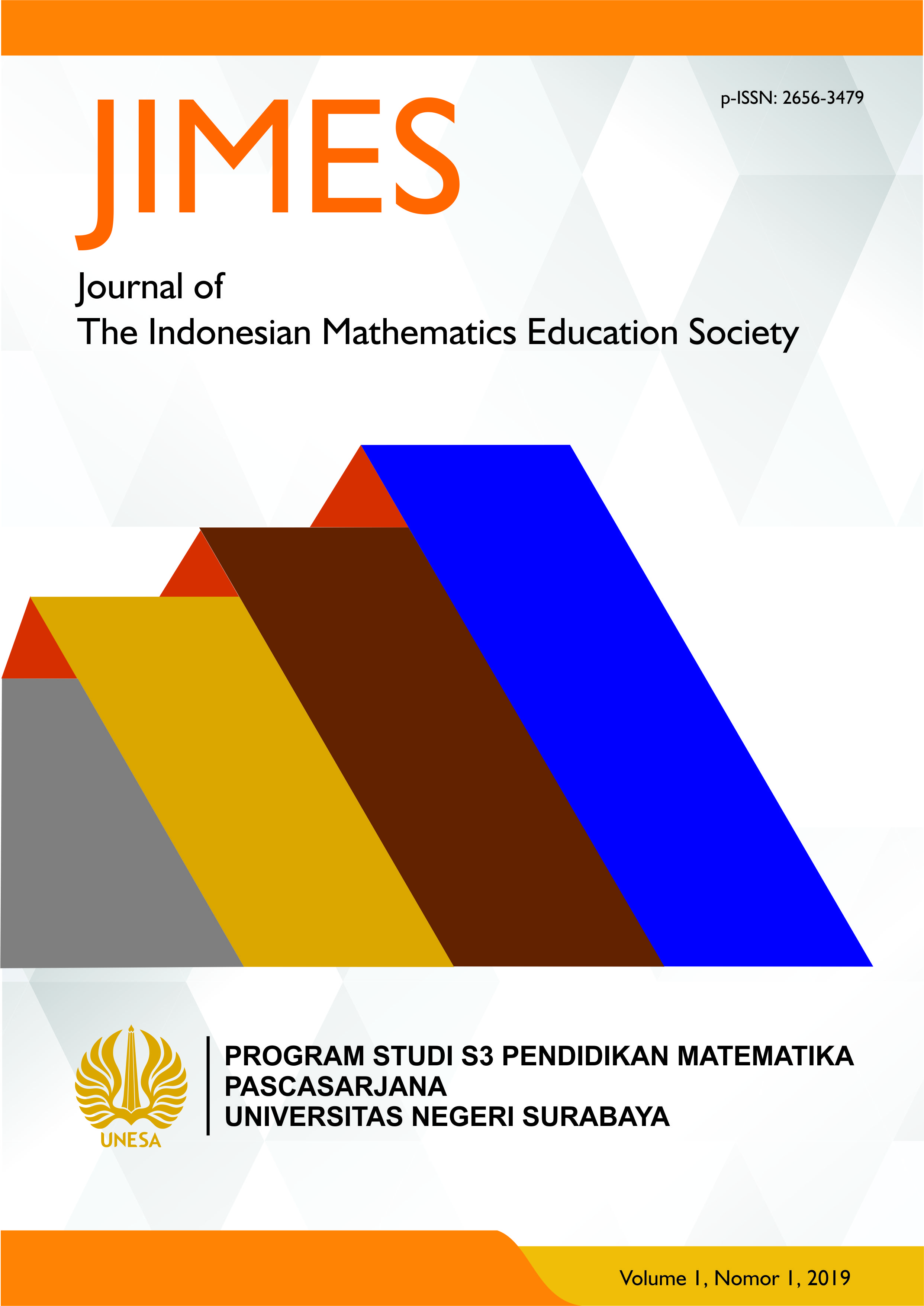Archives
-

Journal of the Indonesian Mathematics Education Society
Vol. 3 No. 2 (2025)ISSN: 2656-7253 (Online) | 2656-3479 (Print)
Accepted Language: English
Publisher: Universitas Negeri Surabaya
Duration: Approx. 40 days to first decision
Acceptance Rate: 50% of the total submissions
Audience: Lecturers, Students, Teachers, and Researchers
Geographical Diversity: Indonesia, Malaysia, Cambodia
Citation Analysis: Scopus | Web of Science | Google ScholarIssue Description:
This issue features five research articles highlighting innovations in mathematics education and explorations of students’ cognitive and affective aspects in learning. The studies include analyses of junior high school students’ creative thinking in solving fraction and plane geometry problems, and an investigation of how mathematics anxiety and metacognitive insight influence decision-making in problem solving. Other articles discuss the effectiveness of the Think-Pair-Share learning model assisted by Card Sort in improving learning outcomes on inheritance mathematics, as well as the exploration of students’ thinking skills through motivational video-based learning on systems of linear equations in two variables. -

Journal of the Indonesian Mathematics Education Society
Vol. 3 No. 1 (2025)ISSN: 2656-7253(Online) | 2656-3479 (Print)
Accepted Language: English
Publisher: Universitas Negeri Surabaya
Duration: Approx. 40 days to first decision
Acceptance Rate: 55% of the total submissions
Audience: Lecturers, Students, Teachers, and Researchers
Geographical Diversity: Indonesia
Citation Analysis: Scopus | Web of Science | Google ScholarIssue Description:
This issue presents five articles focusing on innovations in mathematics learning and analyses of students’ learning difficulties. The topics include the implementation of the Scratch-Assisted IDEA learning model to enhance problem-solving skills, an analysis of students’ difficulties in solving whole number subtraction problems, and scaffolding based on learning styles in HOTS probability tasks. Other studies discuss the development of RME-based student worksheets and the creative thinking ability of junior high school students viewed from mathematics anxiety. -

Journal of the Indonesian Mathematics Education Society
Vol. 2 No. 2 (2024)ISSN: 2656-7253 (Online) | 2656-3479 (Print)
Accepted Language: English and Indonesian
Publisher: Universitas Negeri Surabaya
Duration: Approx. 40 days to first decision
Acceptance Rate: 65% of the total submissions
Audience: Lecturers, Students, Teachers, and Researchers
Geographical Diversity: Indonesia
Citation Analysis: Scopus | Web of Science | Google ScholarIssue Description:
This issue features five articles that delve into students’ numeracy skills, reasoning, communication, and spatial abilities across various mathematical contexts. The topics include an examination of junior high school students’ numeracy performance viewed from multiple intelligences in solving AKM problems, as well as an analysis of students’ conceptual and procedural errors in algebraic word problems using Polya’s theory. Another study investigates students’ mathematical reasoning when solving ethnomathematics-based problems through the lens of personality traits. Additional contributions explore students’ mathematical communication skills in AKM numeracy tasks based on their impulsive–reflective cognitive styles, and an analysis of junior high school students’ spatial abilities in solving open-ended problems viewed from their levels of mathematics anxiety. -

Journal of the Indonesian Mathematics Education Society
Vol. 2 No. 1 (2020)ISSN: 2656-7253 (Online) | 2656-3479 (Print)
Accepted Language: Indonesian
Publisher: Universitas Negeri Surabaya
Duration: Approx. 40 days to first decision
Acceptance Rate: 70% of the total submissions
Audience: Lecturers, Students, Teachers, and Researchers
Geographical Diversity: Indonesia
Citation Analysis: Scopus | Web of Science | Google ScholarIssue Description:
This issue presents three articles that examine students’ problem-solving abilities, conceptual understanding, and statistical literacy within diverse mathematical frameworks. The first study analyzes students’ mathematics problem-solving skills aligned with Cambridge Assessment International Education (CAIE) standards, viewed through the lens of critical thinking ability. The second article explores reflective learners’ conceptual understanding of social arithmetic word problems using the APOS theory. The final contribution investigates university students’ statistical literacy by considering the influence of prior knowledge and mathematical self-esteem. -

Journal of the Indonesian Mathematics Education Society
Vol. 1 No. 2 (2019)ISSN: 2656-7253 (Online) | 2656-3479 (Print)
Accepted Language: English and Indonesian
Publisher: Universitas Negeri Surabaya
Duration: Approx. 40 days to first decision
Acceptance Rate: 70% of the total submissions
Audience: Lecturers, Students, Teachers, and Researchers
Geographical Diversity: Indonesia
Citation Analysis: Scopus | Web of Science | Google ScholarIssue Description:
This issue highlights five articles that investigate various instructional approaches and cognitive factors influencing students’ mathematics learning. The topics include an examination of working memory capacity in mathematical problem-solving and an analysis of how guided discovery learning supported by GeoGebra can improve student learning outcomes. Another study evaluates the effectiveness of the Jigsaw cooperative learning model using “butik” media in teaching triangles, while a subsequent article reports on the enhancement of students’ mathematics achievement through Problem-Based Learning. The final contribution presents a quasi-experimental study on the use of Math Scrabble media to develop elementary students’ critical thinking skills. -

Journal of the Indonesian Mathematics Education Society
Vol. 1 No. 1 (2019)ISSN: 2656-7253 (Online) | 2656-3479 (Print)
Accepted Language: English and Indonesian
Publisher: Universitas Negeri Surabaya
Duration: Approx. 40 days to first decision
Acceptance Rate: 75% of the total submissions
Audience: Lecturers, Students, Teachers, and Researchers
Geographical Diversity: Indonesia
Citation Analysis: Scopus | Web of Science | Google ScholarIssue Description:
This issue presents five articles that explore students’ thinking processes, problem-solving abilities, and the development of practical learning resources in mathematics education. The topics include an investigation into students’ metacognitive abilities in designing mathematics learning and an analysis of junior high school students’ problem-solving processes based on Polya’s stages from the perspectives of field-dependent and field-independent cognitive styles. Another study examines the practicality of cartoon-designed worksheets for learning plane figures, followed by an analysis of university students’ abilities in solving school-level mathematical problems. The final article discusses the role of immediate feedback in enhancing mathematical communication within contextual teaching and learning.



